It’s common to have doubts about your relationship or partner but what happens when the thoughts become intrusive and affect your daily life? Below is a guide to help you with Relationship OCD symptoms.
This condition is similar to Relationship anxiety where you may ask questions to yourself like, “Is my partner really in love with me?”, “Is there someone better out there for me?”, “What happens if they break up?”, and so on…
Every relationship experiences highs and lows, but the ups and downs in a relationship with a person who has ROCD are far more intense and damaging. So before we delve into the repetitive fears of how to deal with relationship obsessive compulsive disorder or a partner who has this condition, let’s take a look at what it means and the symptoms of relationship OCD.
What Is Relationship OCD?
Relationship OCD, also known as R-OCD, is a form of Obsessive–Compulsive Disorder (OCD) in which a person has intrusive thoughts and compulsive behaviors that are connected to their romantic relationship.
Dating someone with relationship OCD is a challenging situation because in this condition the partner can have repetitive thoughts that center on doubts or fears about the relationship.
They could be unsure of whether they are loved by their partner or if the relationship will survive. Due to these behaviors, the partner needs to be provided with constant comfort and assurance.
This pattern may be very stressful for the individual who is experiencing relationship OCD symptoms, but it can also be quite stressful for the relationship as a whole.
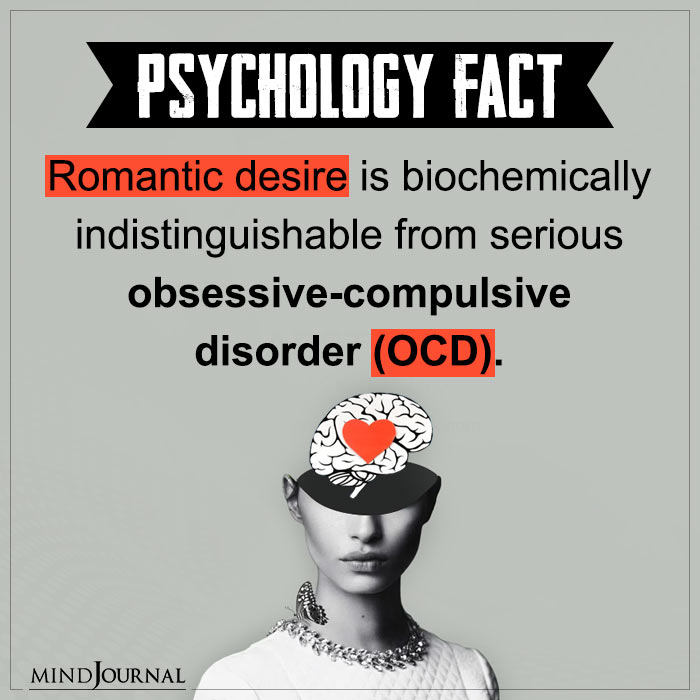
What Relationship OCD feels like
OCD is a disabling mental illness that involves intrusive thoughts and compulsive behaviors. R-OCD involves obsessions, preoccupations, and doubts about the suitability of a relationship.
You can have relationship-centered obsessions and wonder about the intensity of your feelings towards your partner or how “right” your relationship feels. “Relationship obsessive–compulsive disorder symptoms often come in the form of thoughts (e.g., “Is he the right one?”) and images (e.g., the face of the relationship partner), but can also occur in the form of urges (e.g., to leave one’s current partner),” explains a 2016 study.
When you develop relationship OCD, you may experience –
- Obsessive preoccupation
- Doubts
- Compulsive behaviors
- Low moods
- Reduced relational & sexual functioning
You may find yourself constantly questioning your feelings for your partner even when you know you love them. You believe that such intrusive thoughts are unwanted, unwelcome, and unacceptable, which can elevate your stress and anxiety levels.
Relationship OCD can involve certain compulsive behaviors, such as –
- Constantly monitoring your thoughts and emotions
- Comparing your partner to others
- Imagining yourself to be happy in the relationship (neutralizing)
- Seeking constant validation and reassurance about your relationship
Such behaviors are focused on reducing the mental distress and anxiety caused by intrusive thoughts.
7 Relationship OCD Symptoms
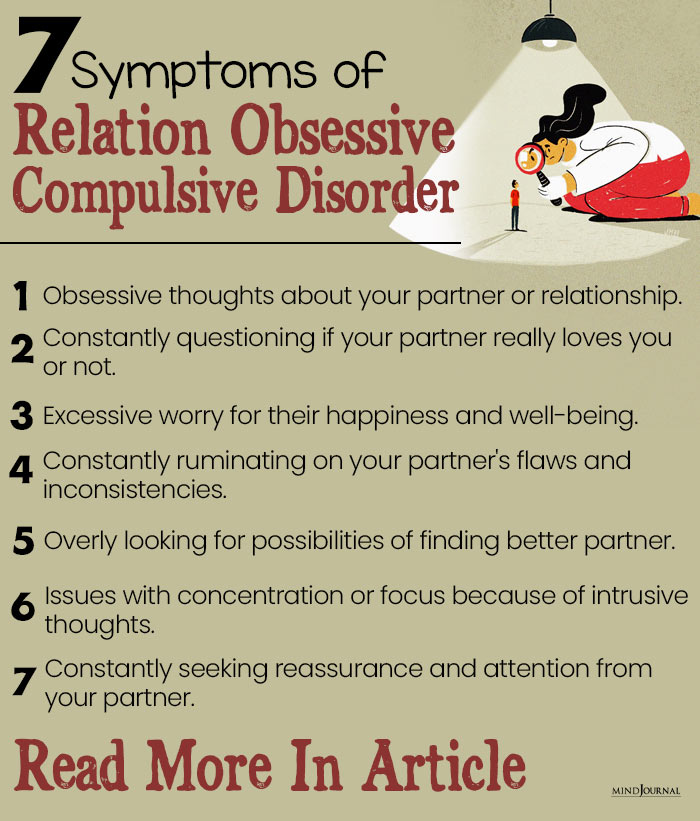
Here are some of the most common relationship OCD symptoms that you need to be aware of –
- Obsessive thoughts about your lover or relationship
- Always questioning whether your partner is truly in love with you
- Excessive worry for the well-being or happiness of your partner
- Constantly considering your partner’s flaws and inconsistencies
- Actively considering the possibility of finding a new, better companion
- Having trouble concentrating or focusing because of distracting thoughts
- Constantly seeking reassurance and attention from your partner
In order to be diagnosed with Relationship OCD symptoms, we have to understand the underlying causes behind these obsessions and compulsions as they interfere with normal activities and ability to function.
Related: 9 Weird Things Your OCD Makes You Do
What causes Relationship OCD?
The precise causes of relationship OCD are unknown, however, a variety of factors may be at play. The factors can affect a person’s chance of getting this condition:
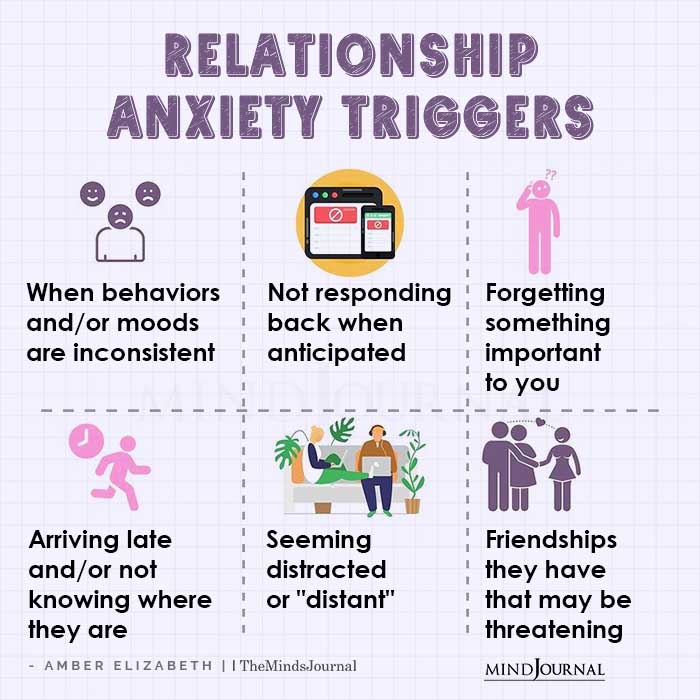
- Sudden life changes such break ups or getting married
- Changes in activity in certain areas of the brain
- A history of abuse in past relationships
- The trauma of the loss of a loved one
- Difficulties in close relationships
- Changes in serotonin levels in the brain
- Having an anxious attachment style
- Poor self-esteem
Treatment for Relationship OCD
1. Exposure and Response Prevention (ERP)
ERP encourages one to confront their fears and situations that cause anxiety or obsessive thoughts.
2. Acceptance and Commitment Therapy (ACT)
It helps patients apply mindfulness and acceptance skills to their uncontrollable experiences.
3. Cognitive-Behavioral Therapy (CBT)
CBT helps one identify and recognize their negative thoughts or unhelpful behavior patterns.
4. Mindfulness-Based Cognitive-Behavioral Therapy
This form of psychotherapy includes cognitive therapy, mindfulness, and meditation.
How to Cope With Relationship OCD?
Relationship OCD symptoms can cause emotional strain on a relationship. And if it is interfering with your dating life, here are some ways to manage them, depending on the severity of the condition.
1. Have an open conversation about your feelings
Open and honest communication is the cornerstone of any intimate relationship, even if you deal with relationship OCD or not.
2. Involve your significant other
It might be beneficial for your partner to become more involved in your treatment. Your ability to trust one another will increase as your partner becomes more acquainted with your symptoms.
3. Seek therapy or get medical help
This can help you and your partner improve your relationship along and deal with the symptoms of ROCD better.
4. Join a support group
It can be helpful to learn how others deal with feelings of hopelessness or embarrassment in order to fully understand yourself.
Related: Breaking Free Of Obsessive Compulsive Disorder (OCD)
Takeaway
If you’re in a relationship where ROCD is having an impact, keep in mind that treatment is always available. You deserve happiness, and with the correct support, information, and guidance you can have a healthy relationship.
Frequently Asked Questions (FAQs)
How to know if you have relationship ocd?
Even if you don’t want to act on those urges, having ROCD may intensely keep you focused on your partner. You may feel that these urges will make you question your own love to your partner.
How to deal with Relationship OCD?
There are ways to manage ROCD symptoms when it is really interfering with your romantic life – from medical treatments like Cognitive-Behavioral Therapy (CBT) to joining support groups, mindful activities, etc
Are people with OCD obsessive in relationships?
People dealing with OCD frequently desire to be assured that something is perfect or has been fully completed. Even in relationships to an extent, they have obsessions and compulsive behaviors when it comes to sexual intimacy, cleanliness, or thoughts about love.
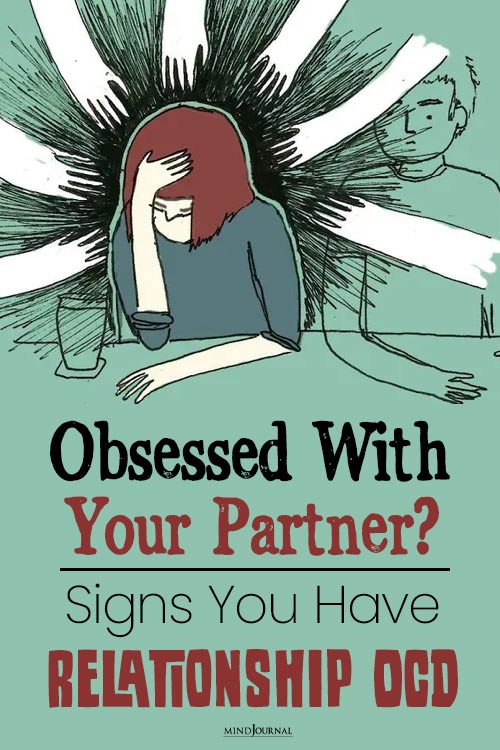
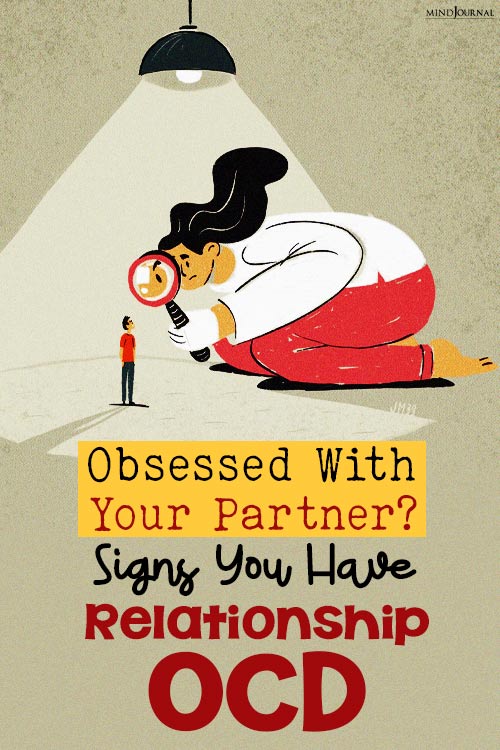
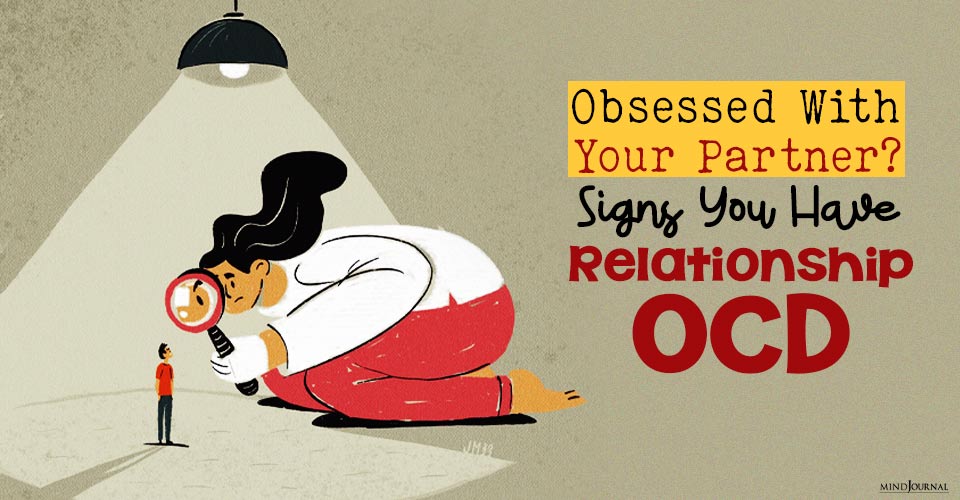







Leave a Reply
You must be logged in to post a comment.